China has established itself as a popular choice for doctors, aspiring and practicing, to pursue and expand their medical education. The country has a growing number of world-class medical institutions as well as state-of-the-art technologies and preferable admission policies.
One of the main attractive qualities is the combined Bachelor of Medicine and Bachelor of Surgery (MBBS) undergraduate degree. The program is considered a fast-track way to doctordom as it only takes five years in China compared to other countries with longer programs and other undergraduate prerequisites. Another reason for many is the lower tuition cost and reasonable cost of living, especially when compared to medical universities in the US, Canada or Germany. The country also offers a multitude of scholarship opportunities for students from around the globe.
Unfortunately, acquiring an MBBS is by no means a shortcut to becoming a practicing doctor. Graduates are still required to pass a medical licensing exam in their home countries in order to practice medicine. The option to stay in China and pursue a higher level of medical degree can open career pathways but it also has another major benefit. China’s staggering 1.425 billion people ensure a constant supply of patients in all fields of medicine with all manner of rare and curious maladies.
This month, we spoke with two doctors to discuss their experience of medical education in the Middle Kingdom.
Plentiful Patients
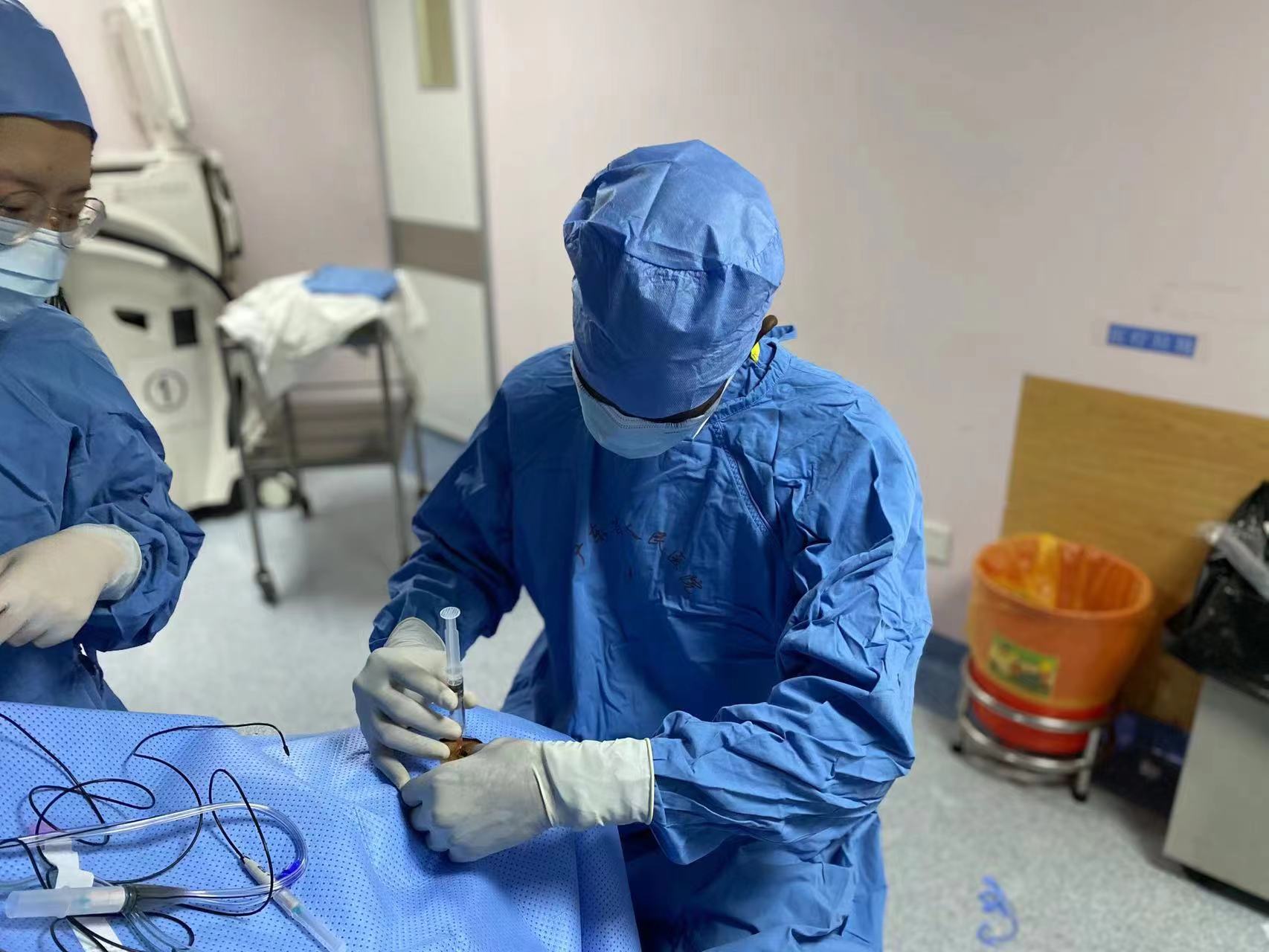
Dan Lawali in surgery. Image via Dan Lawali
Dan Lawali graduated from Abdou Moumouni University of Niamey in his home country of Niger in 2018. He was fortunate enough to be granted a special scholarship to complete his master's degree through a bilateral government cooperation initiative between China and Niger.
“In my country, we have a lack of ophthalmologists — I don’t think we even have 50. The main reason I chose medicine wasn’t about earning money or finding a better life, but rather I felt Niger has a need and I wanted to find a useful way to help my country. When I realized there was a shortage in this field and that some people needed to go out of the country to Morocco or Algeria for things like cataract surgery, I chose it as my specialization.“
He began eyeing China as a way to broaden his medical horizons in order to better serve his country in the future. His theory was that, due to the enormous size of the Chinese population and the abundance of myopia therein, he would gain a vast and valuable skillset to become an able and experienced ophthalmologist. “One of the things that led me to China was that, even on television, I realized that everyone in China wears glasses.” Lawali laughs, adding, “as an ophthalmologist it’s good for me if everyone has eye problems.”
The prevalence of myopia across East and Southeast Asia is well documented. Some studies found as many as 80% of students to be myopic after 12 years of schooling. A common thread between East Asian countries is notably high-pressure school systems. The enormous burden of homework for students, especially in early grades compared with other countries, results in very little time spent outside. Furthermore, abundant homework means excessive ‘near work’ — short focal distance reading and writing.
Time spent outdoors plays a measurable role in reducing myopia in young people. Research published on PubMed reveals that clinical trials in China demonstrated a 25-50% reduction in myopia observed over a three-year period when students spent two hours doing daily outdoor physical activity. Tests done on mice suggest that exposure to sunlight releases dopamine in the retina which then inhibits axial elongation, the anatomical event which leads to myopia.
National Health Commission data reports that myopia among children is at nearly 54% and that figure climbs to 81% for high school students and 90% by university. By comparison, Kaiser Permanente data from the US suggested a nationwide prevalence of childhood myopia of just 36%. That average sits between 41% in urban areas and less than 16% in rural areas. According to South China Morning Post, China’s smaller cities have higher rates of myopia than larger cities — a predicament attributed to lacking resources for diagnosis and treatment in more remote areas.
In recent years, China has focused a number of public health policies on combatting myopia. These range from increased vision testing among students to mandating reduced screen time for youth and policies to limit after-school tutoring and it's resultant additional ‘near work.’
The Ministry of Education and the National Health Commission have developed indicators to evaluate the performance of local governments in rolling out the Five-year Plan of Eye Health. Bold targets have also been set with a 2030 timeline to reduce the incidence of myopia among primary students to under 38% and curtail it in middle and high school to below 60% and 70%, respectively, as per the PRC State Council’s official website.
Lawali says he attends nearly 40 surgeries over the course of a weekend and this is exactly the exposure he expected from his training in a Chinese hospital. Lawali gets to experience the whole spectrum of ocular disease — from cataracts to late-stage infections and a number of examples that are so technical we won’t even try to transcribe them.
Foot in the Door
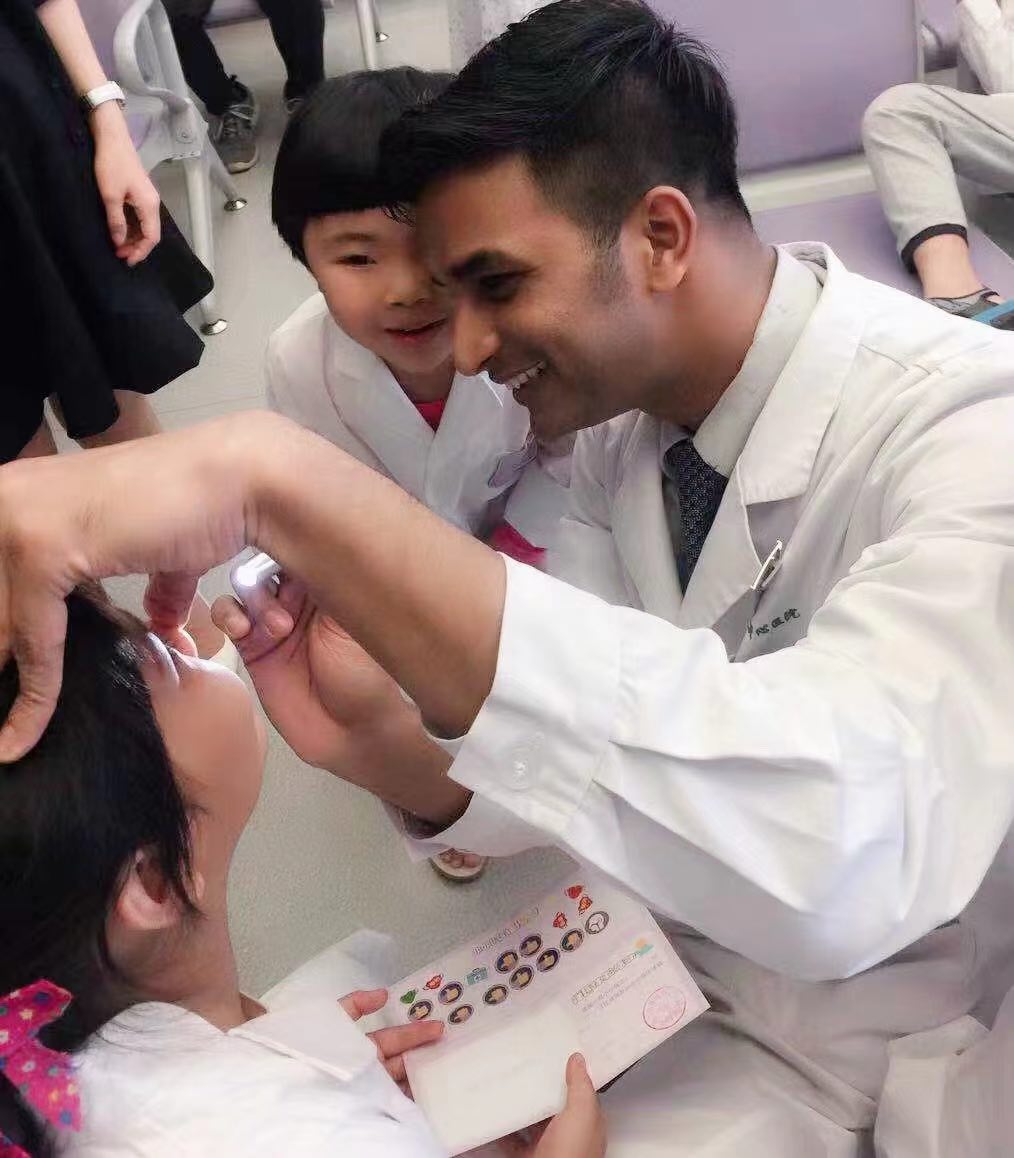
Dr. Vikalp Jadav Vadathya. Image via Fosun Health
Dr. Vikalp Jadav Vadathya, who often goes by Dr. Neil, came to China in October 2007 to begin his MBBS. He was accepted into Norman Bethune Medical College at Jilin University which ranks among the top ten medical programs in China and the top 500 in the world. Coming from India, Vadathya admits that scholarship opportunities are very difficult to capture as all the top students are vying for sometimes just one position for an Indian student on scholarship.
Vadathya tells That’s about his desire as a young man to leave India to study abroad, see the world and make something of his life. At the time, he knew that Australia, China and Russia were his best options for medical school. “Back then Australia had the ozone hole going on (originally discovered in the 1970s, NASA images from 2005 show the ozone hole covering 27 million square kilometers) so my mom was really scared about that. I knew that Russia would be very cold, so I chose China. Nobody told me that the place I was going to in China was also very cold,” he adds with a chuckle.
Knowing that China is a top choice for aspiring Indian doctors, we asked Vadathya why he didn’t want to stay in his home country for his schooling. “Medical universities in India are actually pretty good and doctors who graduate from them can go and work as doctors in other countries all around the world. We have a saying in India that if you can finish your master’s degree at a university in India then you don’t have to worry about the MLE — the American medical licensing exam.”
The problem, Vadathya laments, is that medical university enrolment in India is governed largely by the ‘caste system.’ There are sometimes very few seats for a specific caste at any given university and the competition is fierce. According to Vadathya, undergraduate students need to work very hard for several years just for a chance at acceptance into India’s medical universities. “I felt that those years were very precious to me and medical knowledge is accessible anywhere in the world so why not leave and not waste that time.”
According to the BBC, India’s ‘caste system’ is one of the oldest surviving forms of systemic segregation in the modern world. It is derived from ancient Hindu law and consists of tiered categories based on ethnic background which weigh heavily on which jobs are available to each group.
Back in 2007, the MBBS was a longer program that combined the Bachelor of Medicine, Bachelor of Surgery and a subsequent master's program. He chose to specialize in Otolaryngology — the surgical specialty focused on the ears, nose, and throat. Altogether the program took almost nine years and Vadathya graduated in 2016 in a graduating class of 580 students.
If Vadathya had only completed the MBBS in China then he would have to pass the Medical Council of India eligibility test. Then he would need to complete an internship program before starting to work in India or applying for an International Medical License. The system within China has evolved in recent years and Vadathya is currently guiding a number of doctoral students to complete their education in China as they can now do their internships at Chinese hospitals and apply for medical licenses directly, an option that wasn’t there in 2016. He adds, “I think this is our duty as seniors to help juniors and give them a better future.”
Eyes On the Prize
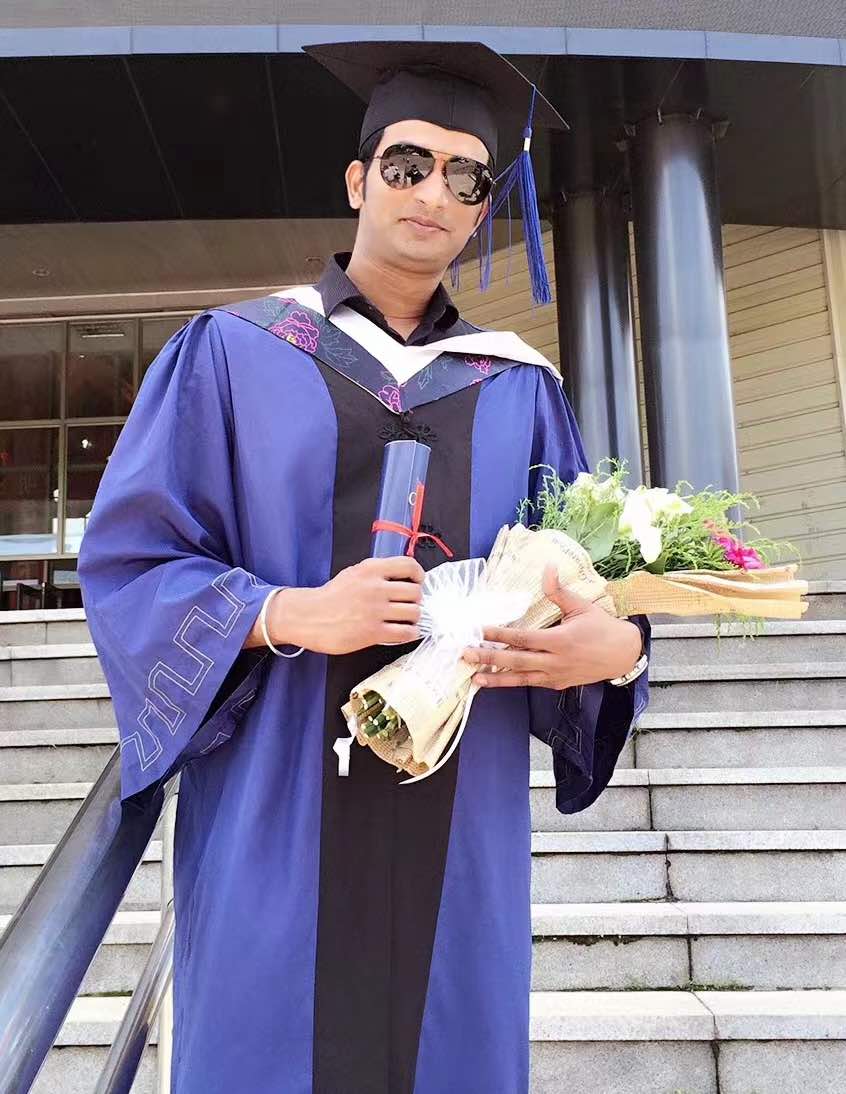
Dr. Vikalp Jadav Vadathya at his own graduation.
Of more than 400 medical universities to choose from, only 45 offer the MBBS program fully in English. Furthermore, all English MBBS programs require Chinese language courses although some do not require students to pass the HSK exam to graduate.
Lawali is doing his residency training at Guangdong Province People’s Hospital and was required to complete the Chinese language requirements as part of his Master's degree.
“I’ve only been studying Chinese for about 8 months and so one obstacle is I am not yet able to fill out the surgery reports in Chinese. Normally you have to study Chinese for one year before you go to the hospital. Nonetheless, I started my residency at the hospital a few months earlier than expected because I suggested to my supervisor that the language skills I was acquiring would be learned faster when applied to the actual setting of a working hospital.”
Lawali describes how he dove into the hospital atmosphere with an eagerness to master the necessary skills of communication. He laughs as he remembers how he would take his phone to try and translate the patient records and understand everyone’s diagnosis and the steps being taken. However, as his speaking ability improved, he began strolling through the ward and asking the attending physicians and surgeons about each patient in each bed. After a few months of this, they began letting him get his hands dirty (so to speak) in the surgery theaters.
“My supervisor often says, ‘If I have Lawali as my assistant in surgery then I already feel like the surgery is successful.’ He knows I’m not able to write the surgical record but he knows I can explain the prognosis to the patient, the procedure of the surgery and how to do the post-surgery care.”
“As for the draping, sterilizing, anesthesia and so on, I have already mastered these skills. I am able to get along really well with my coworkers which is very special for a foreigner in my situation. Trust is really important in the surgery room so I really took the time to be respectful and learn the way that all the nurses and surgeons expect things to be done.”
We ask Lawali if the need for doctors makes it easy for non-Chinese graduates to find positions in healthcare. Despite the need for doctors, he says it’s not particularly common. He only knows a small handful of foreigners who work in Chinese hospitals and they, like him, worked very hard to impress their supervisors in order to carve out those opportunities.
Despite the shorter time commitment of a Chinese MBBS being a major attraction, it can prove to be a disadvantage when it comes time to find a job. Lawali says he has friends who did the five-year MBBS program and returned to Niger and were subsequently unable to find work.
“It’s unfair,” decries Lawali. “In my country, you study medicine for seven or eight years. By the second year, you start going to the hospital to learn nursing, draping, suturing, etc. By the third and fourth years, you are in the hospital every day applying the things you have learned in real-time. Near the end of the program, every trainee will be sent for a six-month stint in a rural area where there is a real shortage of doctors and you really have to do everything. Once you graduate then you will do an internship for another 12 years. This is why when people study in China or Cuba and come back, they are quite lost. When a country has a lack of doctors then it has to build doctors who can actually do the job they will be required to do.”
Lawali explains that the Chinese system leans on specialization. International students who go through the MBBS program in China and then go back to their country of origin might never have actually worked in a hospital, let alone an under-equipped bush hospital. It is through the second phase of medical education that students in China earn their stripes.
The initial phase of the MBBS program was similar for Vadathya back in 2007 as well. “The first six months were focused on learning Chinese and it was all very basic education. I took it upon myself to go and sit in on the senior-level lectures so that I could start learning the real skills of a doctor right away. As an international student, the professors don’t really know who you are until you go and talk to them. So I would go and listen to the senior lessons and ask questions, then go back to my first-year classes. They told us we couldn’t go into the hospital until the fourth year of our program and those hands-on classes would only be once or twice a month. I was able to go in my second year because I knew all of the doctors already.”
He laughs as he recounts that, once the doctors took a liking to him, he used to pack his things and sleep in the staff rooms of the hospital. “I wanted to see every surgery and I was very curious about learning practical knowledge.”
Despite his rigorous enthusiasm and high marks, the policies in his graduating year prevented him from staying in China. Even as recently as 2016, he tells us that foreigners were not yet allowed to work as doctors in China with the exception of private hospitals. The perceived lack of opportunity caused him to return to Delhi to begin working as a fully accredited doctor.
“When I was working in Delhi, I realized that there were a lot of Chinese people traveling to India for a variety of treatments. One of his patients was impressed by his professionalism and his demeanor and suggested that he come back to China to work for the organization in which he is now a General Manager.
Vadathya returned to China in 2018, the same year as Lawali, and worked as a doctor for one and a half years until his hard work was acknowledged and he was promoted to the hospital director.
“I came to China as a doctor but then I got promoted to director and now I’m the general manager — but it’s not the same as being a doctor. When you’re a doctor, you’re tired and you have to work so many extra hours. But when a patient takes your hand and says 'thank you,' that feeling is different and it makes you feel so happy inside.”
The Hippocratic Oath
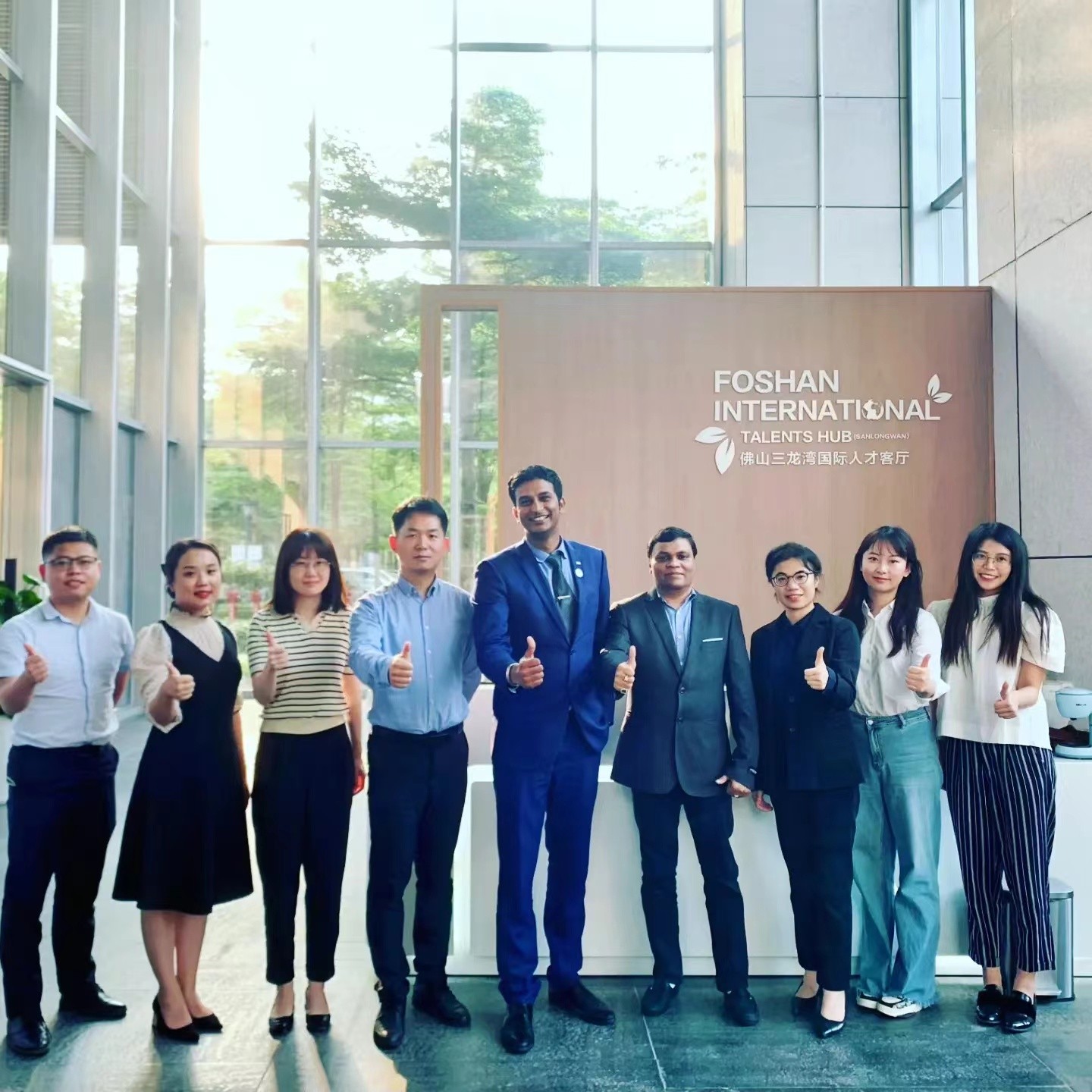
Dr. Vikalp Jadav Vadathya and his team. Image via Fosun Health
Lawali repeatedly mentions how lucky he is to have found himself in such a supportive and welcoming work environment. He considers it a second home and says he nearly always goes in on the weekends as that’s when most surgeries take place, despite those being his days off. His hospital often tells him that he should stay there as a resident surgeon when his program finishes next year. If he took the job he could bring his family to China and he knows that the technology he has access to allows him to help patients and perform surgeries in ways that will be beyond the capabilities of a hospital in Niger. Nonetheless, Lawali always planned on taking his knowledge home, and, when asked how old his son is, he shifts uncomfortably and admits that he has never hugged his son. His wife was pregnant when he came to China to begin the program and, shortly thereafter, the pandemic made it impossible for him to return without losing his placement. “I miss my family and the atmosphere of my country. Even if I have a job at a really good hospital, I think I will need to go home.”
We asked Vadathya if he held any desire to return to India to be a doctor. “I am Indian and I love my country but China has shown me a new life and things I didn’t know I could become. As long as I have the opportunity to work in China, I will appreciate that opportunity.”
Lawali and Vadathya both paint a clear picture that the opportunities they captured came from adamant overachieving. Nevertheless, if you're committed to doing a master's degree in China as well, the Chinese MBBS seems both time and cost-effective. Most importantly perhaps, the vastness of China's aging populace means you’re likely to find a living sample of every ailment in your medical textbooks. Both doctors also exemplify the changing landscape of medicine in China and the abundant opportunities therein.
[Cover image via Dan Lawali]
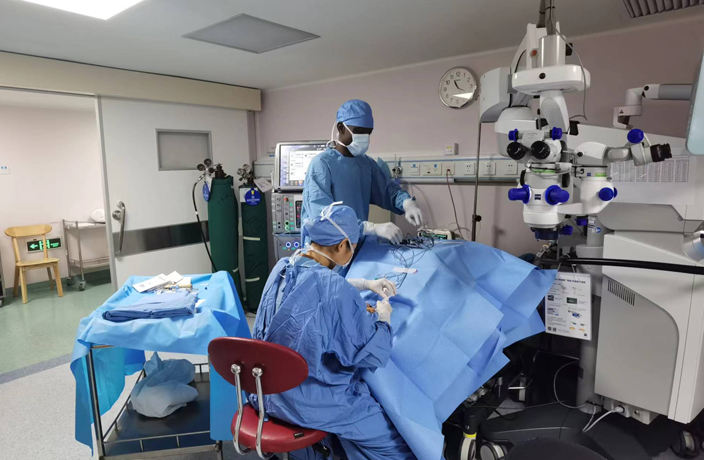





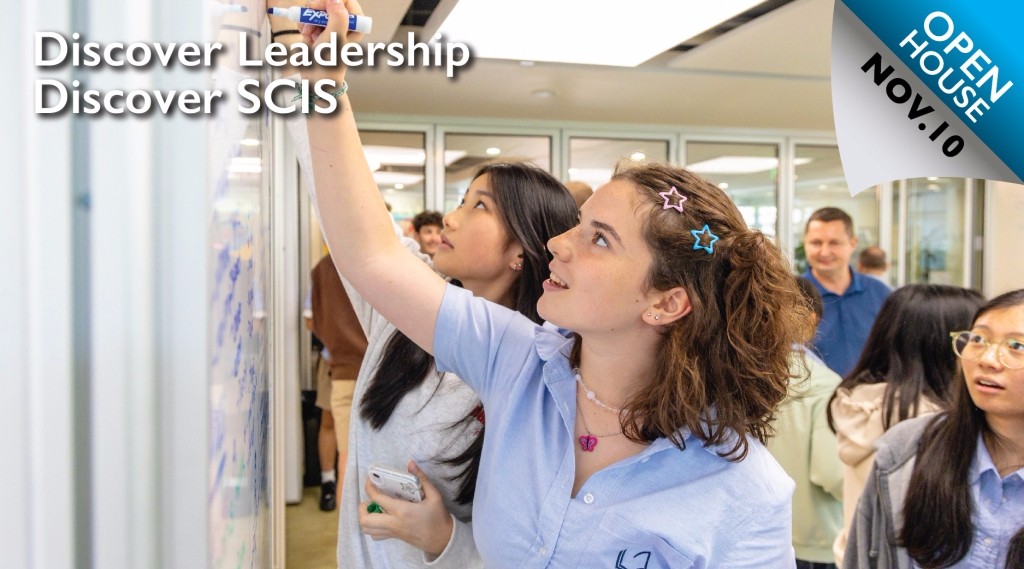
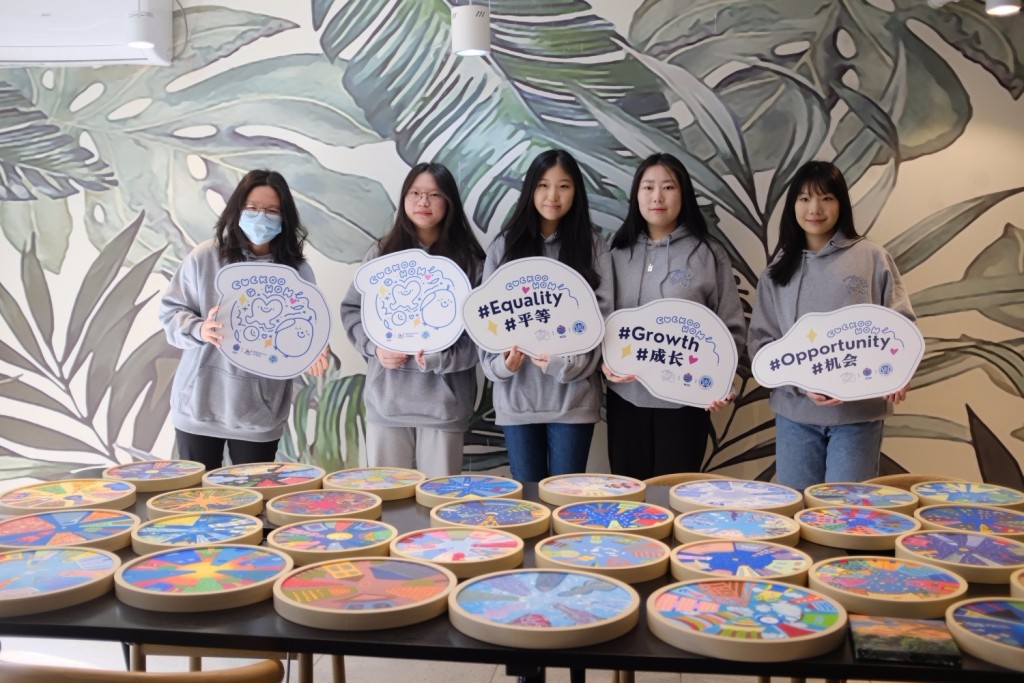













0 User Comments